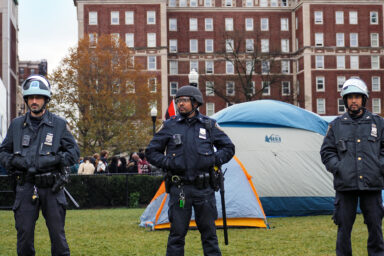Why is torching a police kiosk an admirable thing in Syria but cause for consternation in the United States? Why is protest against corrupt central power in one country a good thing—and something to be dismissed in another? WhoWhatWhy asks….WhyWhyWhy
A recent article in the New York Times underlined the double standard at the heart of mainstream news coverage of the conflict in Syria—and of unrest back home in the United States.
Under the headline “A Faceless Teenage Refugee Who Helped Ignite Syria’s War,” the Times tells the story of bold teenagers whose acts launched the uprising that will likely lead to the end of the long-running Assad family dictatorship in Syria:
That war’s brutality has made it difficult to recall, let alone celebrate, the uprisings’ beginnings.
While the article may well represent events accurately, both the writer and the parent newspaper seem unable to situate the meaning of those events in Syria in the larger dynamic of freedom and democracy worldwide.
The article is based on interviews with unnamed witnesses and participants in the initial acts that led to the wider uprising. It tells of the teenager who impetuously spray painted a public warning to President Assad that he would be the next leader toppled in the Arab world’s spreading democratic ferment—and the arrests and torture that followed, with demonstrations and uprising on their heels.
Only later do we read, almost in passing, of another act of public vandalism by the same young man—a more serious one.
It was not just the graffiti: the cousin had set fire to a new police kiosk the same day in another act of lashing out.
The overall tone of the article is that the young man is a brave figure, to be admired. And, of course, that is correct. The problem is this: how would the New York Times react to a teenager in New York setting fire to a new police kiosk? How would it react to graffiti sprayed on the wall of the New York Times’s new headquarters building?
More, how does the paper salute the burgeoning revolution right here at home, by youths (and seniors alike) sick and tired of the corrupt establishment of which The Times itself is very much a part? Answer: it pays the most minimal lip service, but more often than not treats democratic revolt at home as a rather pathetic thing. It pays far too little attention to the steadily-mounting array of constitutional threats from our home-baked national security state. It pays far too little attention to the abuses foisted upon the population again and again and again by a corporate oligarchy that limits our range of electoral and policy choices.
And that is why we must be very, very suspicious about the enthusiasm which the American establishment exhibits for rebellion abroad—very selectively, only in certain countries, and not in others: in Iran, but not (until the uprising had already succeeded) in Egypt. In Syria, but not in Saudi Arabia. In Libya, but not in Bahrain. In the Middle East, but only the most tepid kind….here at home.
Either we want real democracy and freedom of expression, or we don’t.
# #
[box]WhoWhatWhy plans to continue doing this kind of groundbreaking original reporting. You can count on it. But can we count on you? We cannot do our work without your support.
Please click here to donate; it’s tax deductible. And it packs a punch.[/box]
GRAPHIC: https://wp.patheos.com.s3.amazonaws.com/blogs/getreligion/files/2012/10/double-standard-shirt-american-apparel-unisex-fitted-tee-light-blue-w760h760.jpg




